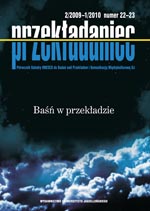W przekładzie, czyli pomiędzy językami
In Translation, That Is, Between Languages
Author(s): Elżbieta Wójcik-LeeseSubject(s): Language and Literature Studies
Published by: Wydawnictwo Uniwersytetu Jagiellońskiego
Keywords: literary translation; critical commentary; translation theory; comparative literary studies
Summary/Abstract: Poets, but also writers of prose (especially poetic prose), who compose in France, Spain, Italy, Slovenia, Bosnia and Herzegovina, Serbia, Greece, Bulgaria, Hungary, Germanspeaking countries, Poland, Russia and the former Soviet Union, Estonia, Finland, Norway and the Netherlands “should be particularly compelling for English-language readers.” This opinion, which cannot be undermined, guides John Taylor, an American critic, writer and translator, on the journey of discovery. His sixty-three essays, articles and reviews (published between 1981 and 2008 in, e.g., the TLS, Yale Review, Antioch Review, Poetry or Absinthe) do not aspire to exhaustiveness; instead, they signpost readerly experience, but also ignorance which needs to be overcome, hopefully by means of translation. With this aim in mind, Taylor assembles his compendium entitled Into the Heart of European Poetry, where he presents authors who have earned his love and respect; those who share certain philosophical and religious premises as well as pursuits: “the exploration of the quotidian (not just facts and routines, but its very essence), the search for the ‘thing-in-itself’ (and the corresponding anxiety of being hopelessly separate from both the material world and imaginable transcendent realms), the grappling with such dichotomies as subjectivity and self-effacement, presence and absence, or negativity and affi rmation, as well as the examination of ‘origin’ and uprootedness as categories that are as ontological as they are geographical, historical, political, sociological, or cultural.” More signifi cantly, the 405 pages of this anthology celebrate particularity and multilinguality. Taylor, who “as a product of the American public school (...) had studied not a single foreign language at the time, except a bit of Latin,” has since lived in Germany, Greece and France, and has translated from the Greek and French. Therefore, his collection gives testimony to the resourcefulness of translators: those named and those (yet) unnamed. As we read, spatial “in-betweenness” transforms into linguistic “in-betweenness” – somewhere between English and the original we arrive at comprehension, however partial. “In-translation” is indeed a special case of “in-betweenness.”
Journal: Przekładaniec.
- Issue Year: 2009
- Issue No: 22-23
- Page Range: 355-359
- Page Count: 5
- Language: Polish

